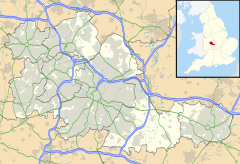Washwood Heath, Birmingham
| Washwood Heath | |
|---|---|
|
Washwood Heath shown within the West Midlands
|
|
| Population | 32,921 (2011 Ward) |
| • Density | 80.7 per ha |
| OS grid reference | SP105885 |
| Metropolitan borough | |
| Metropolitan county | |
| Region | |
| Country | England |
| Sovereign state | United Kingdom |
| Post town | BIRMINGHAM |
| Postcode district | B8 |
| Dialling code | 0121 |
| Police | West Midlands |
| Fire | West Midlands |
| Ambulance | West Midlands |
| EU Parliament | West Midlands |
| UK Parliament | |
Washwood Heath is a ward in Birmingham, within the formal district of Hodge Hill, roughly two miles north-east of Birmingham city centre, England. Washwood Heath covers the areas of Birmingham that lie between Nechells, Bordesley Green, Stechford and Hodge Hill.
Saltley on the south-western side and Ward End on the north-eastern side of Washwood Heath are the two areas that cover the entire ward, though some parts near Nechells and Hodge Hill do not come under either of these and are simply headed under "Washwood Heath". One of the area's major employers was the railway works owned by Metropolitan-Cammell (later GEC-Alsthom), but it closed in 2005.
According to the 2001 Population Census, there were 27,822 people living in the ward with a population density of 5,335 people per km² compared with 3,649 people per km² for Birmingham. The area is 5.2 km². Washwood Heath is an ethnically diverse community with 57% (15,863) of the ward's population being of an ethnic minority compared with 29.6% for Birmingham. It had been a major Irish community.
The area is served by Washwood Heath Academy. For the younger population, there is a children's centre.
The ward is represented on Birmingham City Council by three councillors: Mariam Khan, Ansar Ali Khan and Mohammed Idrees, all Labour.
Project Champion is a project to install a £3m network of 169 Automatic Number Plate Recognition cameras to monitor vehicles entering and leaving Washwood Heath and Sparkbrook. Its implementation was frozen in June 2010 amid allegations that the police deliberately misled councillors about its purpose, after it was revealed that it was being funded as an anti-terrorism initiative, rather than for 'reassurance and crime prevention'.
...
Wikipedia

